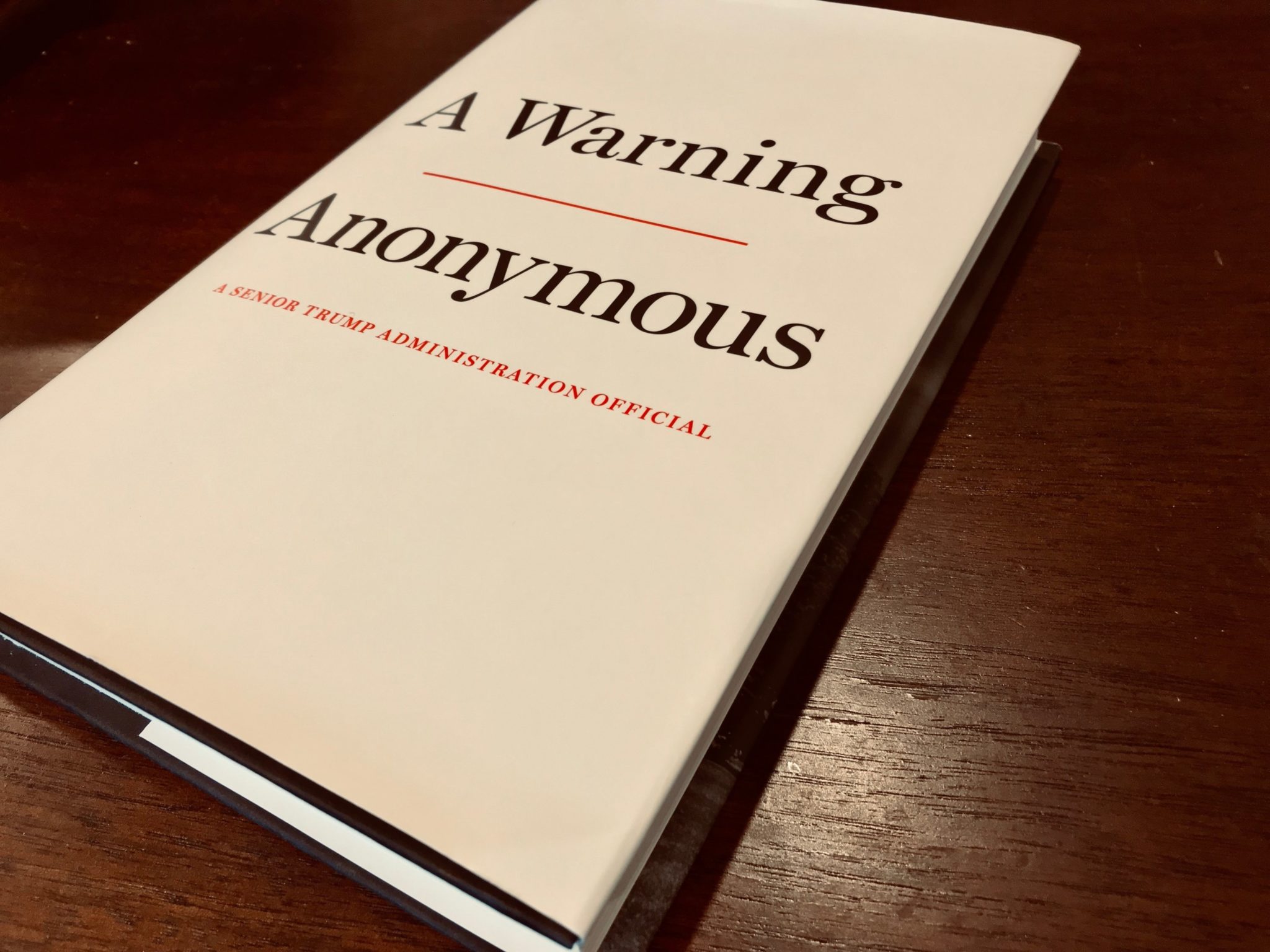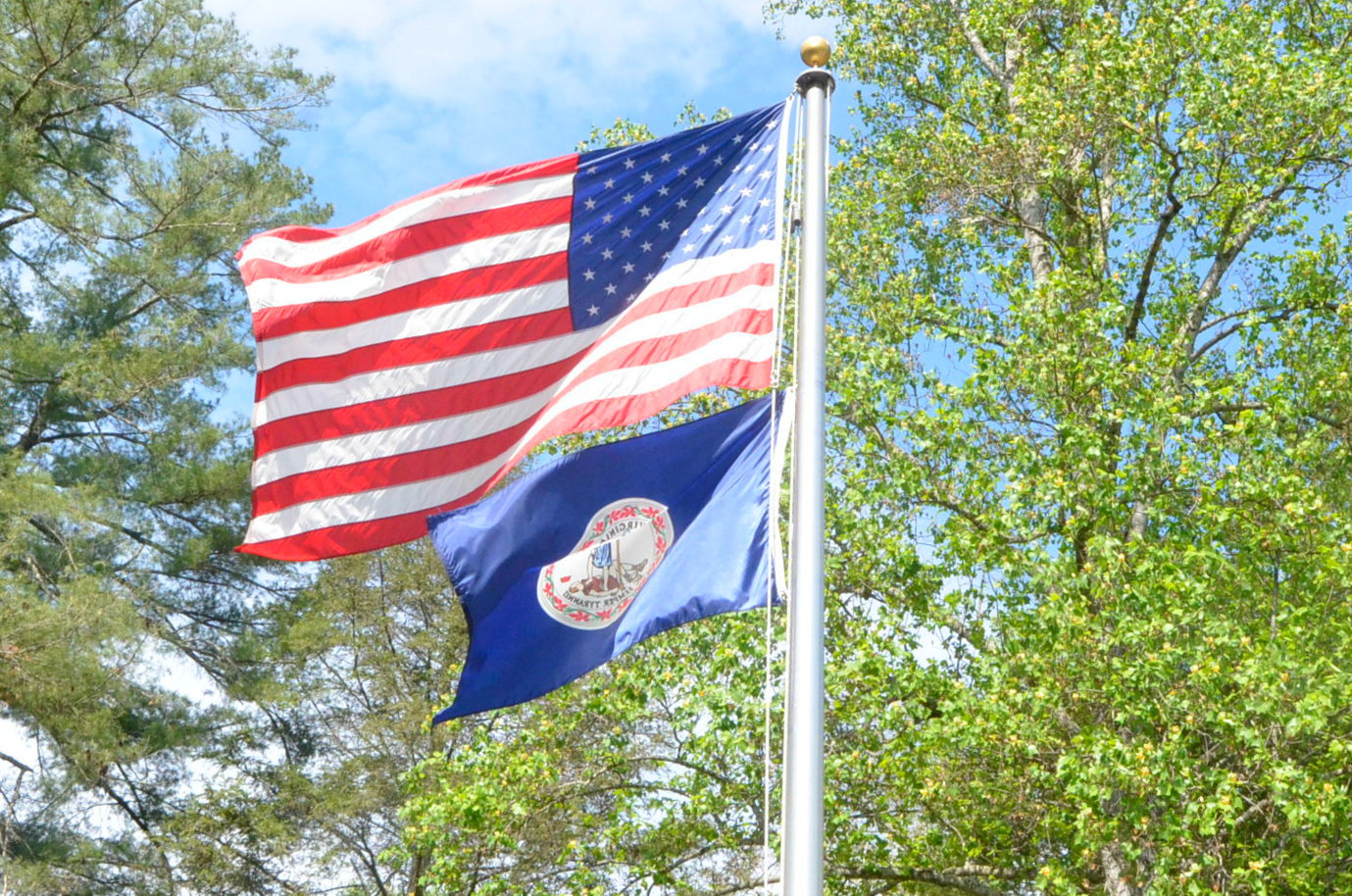Unfortunately for Anonymous, reviews for A Warning have been mixed. Nevertheless, the book’s arrival has occasioned a new Washington parlor game: Who wrote it? And why?
The speculation has been varied, but with little to show. Some have read the text closely to discern writing patterns. Others homed in on the book’s dedication, which is penned to the author’s children. On Fox, Trump loyalist Katrina Pierson speculated that the author was an advisor close to Trump (a bold surmise, if only one ignores the book jacket that describes Anonymous as a “senior administration official”). Meanwhile, Anonymous apparently feels at ease enough to have held a live Internet chat last week on Reddit.
Who is well-placed, well-hidden, and bold enough to pull this off? We have no idea! But neither does anyone else among the chattering class. So, we figured, why not engage in the same amateur plumbing? What follows is our (highly uncorroborated) list of suspects based on seniority status, employment timing and key book details. The result is some familiar faces, as well as lesser-considered possibilities of Anonymous’ identity.
Happy speculating.
The methodology
There are 1.2 million civilians in the executive branch. Though the person is a “senior” official in the administration, the Times and Hachette have been coy about what “senior” means, or whether the official still serves in the administration. Even if Anonymous worked inside the Trump White House, that would make the author one of more than 1,200 employees. As a senior official put it to Axios: “There are dozens and dozens of us.”
Luckily, the content of the the book fills in some useful blanks. Based on these tells, the author would likely have some or all of the following nine factors:
- The McCain Factor. Anonymous has great affinity for John McCain, writing that it was events surrounding the death of the late senator that prompted him to act out.
- The Cohn Factor. Anonymous excoriates Trump’s trade wars while praising tax reform and deregulation, putting the author in line with the establishmentarian economic views of Gary Cohn, Trump’s first director of the National Economic Council.
- The Foreign Policy Factor. Anonymous despairs over Trump’s treatment of foreign allies, particularly his unbending admiration for Vladimir Putin and Kim Jong Un.
- The Press Factor. The author also singled out Trump’s attacks on the press and plans to donate some of the book’s proceeds to the White House Correspondent’s Association.
- The West Wing Factor. Excerpts describe several insider accounts of sensitive West Wing meetings, which has led some observers to speculate that the official was regularly present on the White House complex.
- The Convenient Timing Factor. Several chronological clues are sprinkled throughout the book. Anonymous indicates they’ve been in the administration since its earliest days. The author also describes a White House staff meeting in which then-staffer Bill Shine boasted that he had just blocked CNN’s Jim Acosta from entering the White House grounds; that episode likely would have taken place November 7, 2018. Anonymous also speaks confidently about things that have changed in the administration since the initial op-ed was published, suggesting they remained in their position into 2019. It’s believed that Anonymous had submitted the book manuscript by this past summer.
- The Ethics Factor. Interestingly, Anonymous writes with unfeigned concern about White House efforts to block congressional oversight, and laments a bygone era in which “great deference was given to ethics officials.”
- The Scholar Factor. Anonymous fancies himself a “student of history,” quoting Jefferson, Madison, and Cicero’s De Officiis at length.
- The Suspicion Factor. Several White House officials have been publicly named as suspected leakers or the author of the Anonymous OpEd.
The candidates (in alphabetical order):
Alexander Angelson. A deputy who came to the White House from the RNC, where he worked under Reince Priebus, Angelson was Special Assistant to the president.
- West Wing / Convenient Timing. Worked in the Office of Legislative Affairs and left the White House late this year.
- Cohn Factor. Part of the team that liaised with Capitol Hill to pass Republicans’ tax cuts in 2017.
- Keep Dreaming: Angelson is only in his late twenties, and doesn’t check off any other motivating factors.
John Bolton. Sure, the famously hawkish National Security Advisor doesn’t cut the figure of a literary leaker. So far, he’s been suggested by the Washington Post and CNN’s Chris Cillizza.
- West Wing / Convenient Timing. Joined the administration in the spring of 2018 and departed just before the announcement of the book.
- McCain Factor. Bolton was allies with McCain, even traveling to Arizona to campaign for the senator multiple times. “John McCain came to my defense in 2005 when my nomination to be U.N. ambassador was under criticism,” he said, adding, “I’ll be grateful forever…”
- Foreign Policy Factor. Bolton’s establishment credentials would have put him squarely at odds with Trump’s admiration for strongmen—a track record of tough talk on Russia so expansive he has criticized the Bush administration in the past.
- Scholar Factor. No doubt Bolton would view himself as “a student of history.” Like Anonymous, in several settings he has also quoted Theodore Roosevelt.
- Keep Dreaming: Bolton hardly has an affinity for the press. The biggest problem: Bolton wasn’t part of the transition team.
Brian Blase. A high-ranking economic advisor, Blase was instrumental in crafting the administration’s efforts to dismantle the Affordable Care Act.
- Convenient Timing. Blase worked in the White House from its first months, stayed through 2018 and left this past summer to start a consulting firm.
- The Cohn Factor / West Wing. Served under Cohn and then Larry Kudlow on the National Economic Council.
- The Press Factor. Wrote extensively for Forbes and National Review.
- Keep Dreaming: Blase has never had a finger pointed at him publicly. And it’s unlikely he’d have much affinity for John McCain, who single-thumbedly torpedoed Blase’s signature efforts to repeal Obamacare.
Virginia Boney. A special assistant to the president and Senate liaison, Boney came to the White House from Lindsey Graham’s office, where she was a longtime senior aide. She was briefly the subject of ire in the pro-Trump Twitter-sphere, where right-wing conspiracy theorist Mike Cernovich claimed White House staffers suspected Boney as a leaker, though not in connection to Anonymous.
- West Wing / Convenient Timing. Boney has remained in the White House since its earliest days.
- McCain / Press / Suspicion Factors. According to Cernovich’s uncorroborated account, Boney was reportedly close with McCain—acquired gossip that should be treated with a considerable grain of salt. (Axios once considered whether Cernovich had “inside access” to White House sources, but went no further—and Cernovich’s post helped get him banned from Medium.)
- Keep Dreaming: Could someone still working in the West Wing—having been accused of leaks before—get away with clandestine publisher meetings and secret book manuscripts?
Andrew Bremberg. Now a permanent representative to the UN, Bremberg came to the White House after serving Mitch McConnell and Scott Walker. Both Omarosa Manigault-Newman and Paul Blest have speculated that Bremberg could be Anonymous.
- West Wing. Bremberg was Trump’s first director of the Domestic Policy Council, where his government pay scale reflected the highest seniority level.
- Cohn Factor. Bremberg was among a small group that waged war on Obama-era regulations.
- Convenient Timing. Three weeks after the OpEd, Bremberg was nominated to be permanent representative to the UN in Geneva, officially reporting there November 12, a few days after the Shine meeting described by Anonymous.
- Keep Dreaming: A post in Geneva doesn’t afford much of an inside look into the White House in the past year.
Johnny DeStefano. A former senior counselor to Trump, DeStefano is another occasionally named suspect—he appeared on speculative lists by Omarosa and the Daily Caller.
- West Wing / Convenient Timing. DeStefano’s work in the White House encompassed a broad purview—the offices of Presidential Personnel, Political Affairs, Public Liaison and Intergovernmental Affairs. His appointment lasted from the inauguration until May of this year, approximately the time Anonymous could have begun working on a manuscript.
- Keep Dreaming: He has a reputation as Johnny “No Drama” and as a rising star in the Republican Party—and thus a lot to lose if, as Anonymous suggests, one day their identity will be revealed.
Jon Huntsman. The former ambassador to Russia, Huntsman is a favorite suspect often put forward by more liberal prognosticators—floated by Slate’s Will Saletan and deemed plausible by Politico’s Jack Shafer .
- Convenient Timing. Huntsman became ambassador to Russia in October 2017, serving two years before retiring last month to run for Governor of Utah.
- Keep Dreaming: Huntsman vociferously denied the charge. And because he’s not in the White House, the up-close details in A Warning would have to be relayed second-hand.
Shahira Knight. Initially an advisor to Trump on economic policy, Knight later oversaw the Office of Legislative Affairs.
- West Wing / Convenient Timing. Knight worked in the White House from the inauguration to May of 2019.
- Cohn factor. Knight served on the National Economic Council under Cohn, and worked on the tax cut package passed by Congress. According to the Times, Republicans on the Hill fretted that Knight would “steer the president toward a more moderate agenda on a range of domestic issues”—approximately what Anonymous boasts of doing.
- Keep Dreaming: Knight’s is not a name you’ll find often in speculation about the author.
Don McGahn. The former White House Counsel was at the center of almost every Trump legal controversy through the first half of the administration—and the center of a few Anonymous guesses, including from New York Times employees and CNN’s Cillizza.
- West Wing / Convenient Timing. Present from inauguration to October 2018, McGahn resigned weeks after the op-ed was published.
- Ethics factor. McGahn was captured in the Mueller Report rebuffing Trump’s efforts to obstruct justice on several occasions.
- Keep Dreaming: McGahn’s complete absence from the White House since 2018 makes it unlikely he had such a direct view into events in the year since the memo was written—including Anonymous’ complaints that Democratic oversight efforts are now routinely routed to lawyers.
Bill McGinley. A dark horse candidate, McGinley was the White House Cabinet Secretary and assistant to the president.
- West Wing. McGinley coordinated information and policy between the cabinet agencies, potentially putting him in a wide range of meetings. He is often referred to as a “senior administration official.”
- Convenient Timing. Worked in the White House since 2017 and departed this summer, then joined a lobbying firm in October.
- Ethics factor. At the NRSC, specialized in managing ethics complaints against members of Congress.
- X-factor. McGinley’s role as the Cabinet coordinator could give him a panoptic view of the executive branch, underscoring Anonymous’ written anecdotes involving officials from the State, Treasury and Commerce, as well as several accounts of cabinet meetings.
- Keep dreaming: McGinley has been with Team Trump since April 2016, when he was hired as a campaign advisor. His tenure from the White House received plaudits from Mick Mulvaney, Elaine Chao and others.
Joyce Meyer. Former Deputy Director of Legislative Affairs.
- West Wing / Convenient Timing. Joined the administration in its first month and departed in October 2018 for the private sector.
- X-factor. A top deputy to Paul Ryan and Mitt Romney before that, Meyer has sterling establishment credentials.
- Keep dreaming: Liaising with Congress might not give as much visibility into national security and foreign policy as Anonymous conveys, and departing in 2018 might be too soon to make pronouncements about the year since.
John Moran. Former associate counsel and DOJ senior official.
- West Wing / Convenient Timing. Worked in the White House from the inauguration until October 2019, when he moved to the Department of Justice.
- Scholar factor. Studied classics at UVA before clerking for Antonin Scalia. Cicero quotes anyone?
- Keep dreaming: An associate counsel may not qualify as “senior official,” and it’s not clear how much Russia or economic policy would connect with Anonymous’ experience in the counsel’s office.
Kirstjen Nielsen. The former DHS Secretary could be making a play for the history books. She’s also been suggested as the Anonymous author by former FBI analyst Josh Campbell and Cillizza.
- Convenient Timing. Nielsen was an administration official since the inauguration until earlier this spring, when she resigned as DHS Secretary.
- X-factor: Tormented by Trump and already on a media rehabilitation tour, Nielsen would have nothing to lose with a book. And her views of Stephen Miller as “preachy” would certainly key.
- Keep Dreaming: Anonymous dedicates the book to their children; Nielsen has none. Plus, Nielsen denied the charges forcefully.
Bill Stepien. A Senior Political Advisor for the Trump reelection campaign, Stepien was first floated as a potential Anonymous suspect by Manigault-Newman.
- West Wing / Convenient Timing. Stepien is one of the longest-serving Trump officials, joining the Trump campaign in 2016 and serving as Political Director until December of last year.
- Keep Dreaming: Any chance of Stepien realistically being Anonymous went out the window when he became entrusted with Trump’s reelection—including a “mission critical” project of annihilating political opposition from the right. (That, or it’s extremely deep cover.)
Amy Swonger. Currently Deputy Director of Legislative Affairs.
- West Wing. The longtime lobbyist has worked in the White House office since March 2017.
- X-factors. A former Senate staffer for Trent Lott and McConnell, Swonger’s establishment credentials are spotless.
- Keep Dreaming: The West Wing snake pit is not exactly conducive for writing a book manuscript.
Close but no cigar
Guy Snodgrass. A New Republic article suggests that Snodgrass, an aide to Defense Secretary Mattis and recent author of his own tell-all book, is actually Anonymous. But even a top-level Pentagon official wouldn’t presumably have cause to deal with Commerce Department officials over wheat export treaties (just one of several granular-level conversations Anonymous recounts with executive branch officials). And why write two books?
James Mattis. The Defense Secretary who resigned in protest certainly saw enough to fill several books—and appeared on Anonymous lists by Cillizza, the Washington Post and at least one gambling site. But Mattis seems too honor-bound for an anonymous tell-all, and he has denied the charge.
Mick Mulvaney. Mulvaney’s name has been floated in forums, such as the Daily Kos, and by NBC News, in seeking comment from Mulvaney’s staff. But for the embattled acting chief of staff, the real question isn’t motive, but means. How does the occupant of the most frenetic job in Trump’s White House find the time to write a book?
Jared Kushner. Sure, he’s a New York Democrat, and yes, he used to own a newspaper. And more than a few dropped Kushner’s name as a plausible source of the Anonymous writings: USA Today‘s William Cummings, researchers at the Post, and Anne Coulter. But Washington’s most practiced sycophant wouldn’t risk sabotaging his own plum job (and the imminent promise of Middle East peace) for an anonymous book—with limited royalties, no less.
Mike Pence. From the get-go, Pence was one of the most widely suspected authors: Floated by Nancy Pelosi, the Boston Globe‘s Martin Finucane, and Vox’s Julia Azari. Initially, several observers homed in on the word “lodestar” in the original OpEd—a favorite term of art of the Vice President’s. But Anonymous’s objective isn’t to replace Trump on the 2020 ticket but to expel Trump from office in 2020. It’s doubtful Pence would be eager to sink his own ship.
Kellyanne and George Conway. From the beginning, either half of the Conway couple was suggested as a plausible candidate for the Anonymous moniker, including by Esquire‘s Charles Pierce and Joe Scarborough. But George Conway denied that the couple was involved in typical form: “I wish.”
A Trump favorite: It’s no one. Some of TrumpWorld’s staunchest denizens have suggested that Anonymous may have been merely a literary invention by the New York Times—hardly a leap for anyone who believes news reports are based on made-up sources. Almost immediately after the op-ed was written, Trump himself questioned whether the official really existed:
Does the so-called “Senior Administration Official” really exist, or is it just the Failing New York Times with another phony source? If the GUTLESS anonymous person does indeed exist, the Times must, for National Security purposes, turn him/her over to government at once!
— Donald J. Trump (@realDonaldTrump) September 5, 2018
Since the publishing of the book, however, the White House has abandoned this view, with the President’s top aides condemning the author and calling on them to unmask themselves.


















